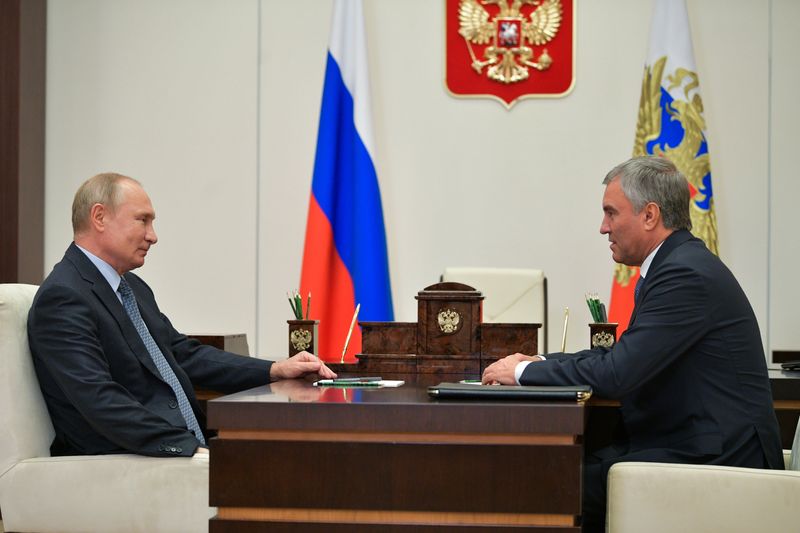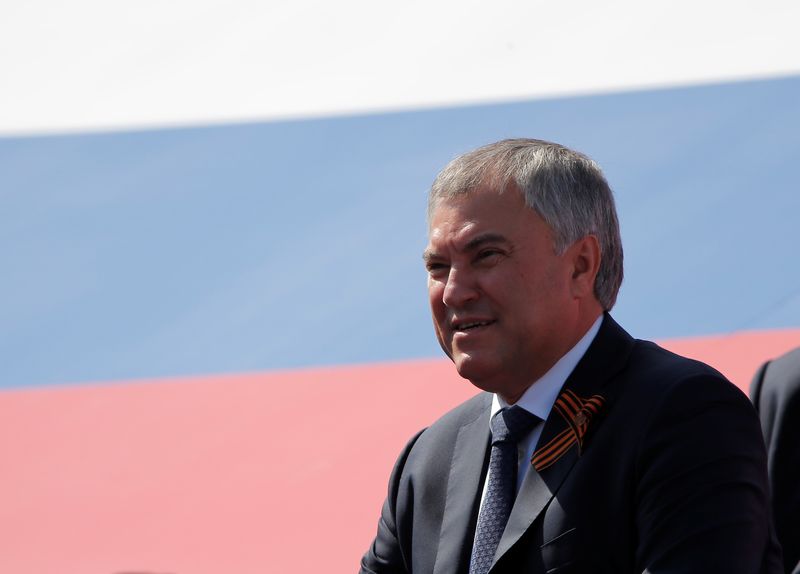By Guy Faulconbridge
LONDON (Reuters) – The Kremlin indicated on Wednesday that all of Russia’s energy and commodity exports could be priced in roubles, toughening President Vladimir Putin’s attempt to make the West feel the pain of the sanctions it imposed for the invasion of Ukraine.
With Russia’s economy facing its gravest crisis since the 1991 collapse of the Soviet Union, Putin on March 23 hit back at the West, ordering that Russian gas exports should be paid for in roubles.
That move forced Germany, Europe’s biggest economy, to declare on Wednesday an “early warning” that it could be heading for a supply emergency. Germany imported 55% of its gas from Russia last year.
In the strongest signal yet that Russia could be preparing an even tougher response to the West’s sanctions, Russia’s top lawmaker suggested on Wednesday that almost Russia’s entire energy and commodity exports could soon be priced in roubles.
Asked about the comments by parliament speaker Vyacheslav Volodin, Kremlin spokesman Dmitry Peskov said: “This is an idea that should definitely be worked on.”
“It may well be worked out,” Peskov said of the proposal.
Peskov said that the U.S. dollar’s role as a global reserve currency had already taken a hit, and that a move to pricing Russia’s biggest exports in roubles would be “in our interests and the interests of our partners.”
Europe, which imports about 40% of its gas from Russia and pays mostly in euros, says Russia’s state-controlled gas giant Gazprom is not entitled to redraw contracts.
“If you want gas, find roubles,” Volodin said in a post on Telegram. “Moreover, it would be right – where it is beneficial for our country – to widen the list of export products priced in roubles to include: fertiliser, grain, food oil, oil, coal, metals, timber etc.”
ROUBLE GAMBLE
Russia exports several hundred billion dollars worth of natural gas to Europe each year. Euros account for 58% of Gazprom exports, U.S. dollars 39% and sterling around 3%, according to the company.
Peskov said Russia will give buyers time to switch to roubles.
Still, the exact way in which payments could be made remained unclear as of Wednesday. Russia is trying to both bolster the rouble and, in the longer run, chip away at the dominance of the dollar in pricing global energy and commodities.
To have any hope of achieving that, Russia would need help from China, the world’s second-largest economy.
“China is willing to work with Russia to take China-Russian ties to a higher level in a new era under the guidance of the consensus reached by the heads of state,” Chinese Foreign Minister Wang Yi said.
Russian Foreign Minister Sergei Lavrov says that Russia’s relations with China are at their strongest level ever.
SANCTIONS ‘BOOMERANG’
Russian officials have repeatedly said the West’s attempt to isolate one of the world’s biggest producers of natural resources is an irrational act of self harm that will lead to soaring prices for consumers and tip Europe and the United States into recession.
Russia says the sanctions – and in particular the freezing of about $300 billion in Russian central bank reserves – amount to a declaration of economic war.
Former President Dmitry Medvedev said the sanctions had “boomeranged” back to undermine European and North America economies, driving up prices for fuel and heating and eroding confidence in the dollar and euro.
“The world is waking up: confidence in reserve currencies is melting like a morning fog,” Medvedev said. “Abandoning the dollar and the euro as the world’s main reserves no longer looks like a fantasy.”
Medvedev said “crazy politicians” in the West had sacrificed the interests of their taxpayers on the altar of an unknown victory in Ukraine. “The era of regional currencies is coming.”
Russia has long sought to reduce dependence on the U.S. currency, though its main exports – oil, gas and metals – are priced in dollars on global markets.
Globally, the dollar is by far the most traded currency, followed by the euro, yen and British pound.
(Reporting by Guy Faulconbridge; Editing by Conor Humphries, Frank Jack Daniel and Tomasz Janowski)



